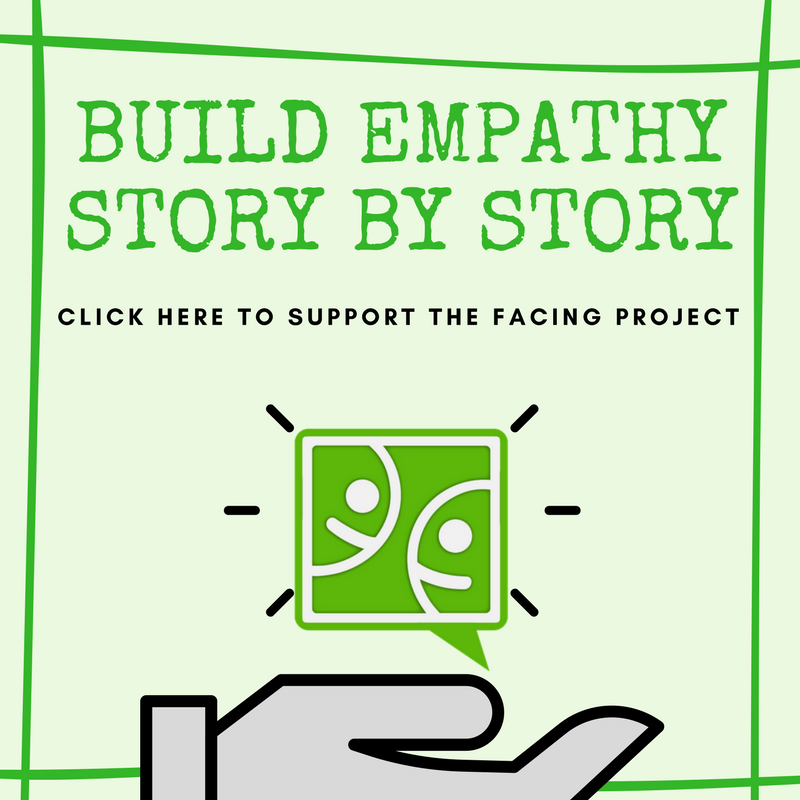Sue Godfrey’s story. She is 42.
As told to Stephanie Fisher
In college my Aunt Jan mailed me a giant box.
In it was an interview suit, pumps, jewelry and a portfolio. That was her graduation gift for me.
When I bought my first home, she put together my kitchen for me while telling me to take a break. That was her housewarming gift to me.
Aunt Jan is my person who knows. She knows what to do in any situation.
When my parents divorced, I chose to live with my dad, and the two of us lived with his brother’s family–Aunt Jan’s family. During the nine months we lived in their house, Aunt Jan was home when I got off the bus. She sat at the table every day after school to talk with me about my day. It was only 20 minutes, the time before her daughter, my cousin, came home. In the grand scheme of things, it was only nine months of my life that I lived in her home, but those simple acts were life changing for me. Those 20-minute conversations set a course for how I have shaped my life in adulthood.
My time at Aunt Jan’s home was a stark contrast from the years before. Growing up the oldest of four kids, I always felt responsible for everyone. I remember two recurring dreams in the second grade that were centered around loneliness and failing to take care of my brothers – a theme that captured both my waking and sleeping. In middle school, I would come home from school, make dinner, and help my three brothers with their homework. My dad worked a lot, and my mom was overwhelmed. I always felt the need to act like an adult.
Aunt Jan wasn’t my only mentor. I always looked forward to my solo summer trips to my mother’s family in Washington, DC, because it was a time when I could be free of responsibility. There I could be carefree and explore. It was on a DC visit, when adventures with my Aunt Pam inspired my love for the arts; she took me to my first play and an art exhibit by a young Chinese girl. Those are experiences I would never have in my day-to-day family life. I realize now the role my aunts played was that of mentor, and my visits with them allowed me to see and experience things I had only read about in books.
My two aunts. Their full attention, however brief, changed my life. When I think about my mentors, I think of them. My occasional visits were life giving. When we were together, they paid attention. They were fully present with me, in a way that made me feel valuable, worthwhile.
Research shows that having an adult in your life that isn’t a parent is so important. My mother and father are wonderfully important people in my life who have always provided for me. They’re amazing grandparents now. Mentors aren’t parents. They play a role that parents can’t. I’m thankful that I had mentors when I needed them.
How different would my life look if I had not had mentors in my life? I wouldn’t be who I am today. Aunt Pam was a guidance counselor, and Aunt Jan was a social worker. I feel like I’m such a blend of those two things. Their influence led me to work in nonprofit administration, and to see the importance of mentoring programs, now as the Executive Director for Big Brothers Big Sisters. I know not everyone has natural mentors in their family. I am committed to helping match caring adults with kids who need someone to care about them, to show them the world from a new perspective like my aunts did for me.
I have many people in my life now who I consider mentors, and a few young people who consider me a mentor. One of my mentees says to me, “You’re my person who knows.” That’s how I think of mentors now. We all need an adult in life who knows the way; someone who can show us new things, new places, and open new doors. Mentors aren’t replacement parents; they are extra people who let you know you are valued. And even though mentoring is so simple, it can change the world, one life at a time.
///
Sue Godfrey and her husband of 16 years, Stuart, are happy to be raising their three wonderfully unique children in Muncie, Indiana. A graduate of Ball State University, Sue has devoted her career to helping people see their own value and pursue their dreams. Her hobbies include cultivating succulent gardens, reading, riding her Schwinn Cruiser and learning new things. Sue serves as the Executive Director at Big Brothers Big Sisters of Delaware County.
Stephanie Fisher graduated from Ball State University with a degree in English. She lives in Muncie with her husband and two daughters and is a content developer for SpinWeb. Stephanie loves reading, cooking, home brewing with her husband, and visiting new places.
Are you interested in seeing more stories like this? If so, we need your help. Check out the Build Empathy Story-By-Story Campaign to learn how you can plug into the work of The Facing Project.
About The Facing Project:
The Facing Project is a 501(c)(3) nonprofit organization that connects people through stories to strengthen communities. The organization’s model to share stories and raise awareness is in cities across the United States focused on topics such as poverty, sex trafficking, mental health, immigration, and more. Facing Project stories are compiled into books and on the web for a community resource, used to inspire art, photography, monologues and—most importantly—community-wide awareness, dialogue, action, and change toward a more understanding and empathetic society.
This story originally appeared in Mentoring in Muncie, a publication of The Facing Project that was organized by Big Brothers Big Sisters of Delaware County in Muncie, Indiana.


